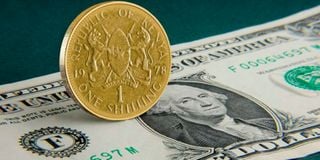Kenyan shilling rallies against dollar to post strongest intra-day gain in years

The Kenyan shilling posted its strongest intra-day gain against the US dollar in 12 years on February 14.
The Kenyan shilling posted its strongest intra-day gain against the US dollar in 12 years yesterday, as it aggressively turned tables against the greenback, reaping from a tide of investor confidence after the government received significant inflows to pay off the $2 billion Eurobond.
The dramatic gain pushed the local unit to its strongest level since November last year while wiping out all the losses this year.
Equity Bank quoted the dollar yesterday at Sh153.75, while KCB had a quote of Sh157.5, the highest among eight banks tracked by the Nation.
Forex bureaus were selling the dollar at between Sh152 and Sh157. On Tuesday, the CBK had quoted the local unit at Sh156.7 against the US dollar.
The record appreciation of the greenback is set to lower import costs in local currency terms as importers are required to part with less shillings for the same volume of goods ordered.
For the government, a stronger shilling will lower debt service costs with the National Treasury equating the movement of the currency by a single unit to impact debt service costs by Sh40 billion.
With the shilling gaining by Sh3.62 against the US dollar in the week to Tuesday, Kenya’s debt service costs have been trimmed by Sh144.8 billion in just seven days.
Holders and earners in US dollars have nevertheless realised paper losses with holdings/earnings of $10,000 for instance falling from Sh1.6 million to Sh1.5 million over the same period representing paper losses of Sh100,000.
Kenya’s move to buy back part of its Sh313 billion ($2 billion) Eurobond notes maturing in June has settled investor nerves, anchoring the multi-day shilling rally by propping foreign currency inflows. Last week, Kenya finally made good on its promise to buy back part of the Sh313 billion Eurobond notes maturing in June this year as part of a liability management operation that seeks to reduce the outsized redemption of the country’s inaugural Eurobond.
At the same time, Kenya, through lead managers Citi and Standard banks, concurrently issued a new Eurobond that has since raised Sh235.05 billion ($1.05 billion) from whose proceeds are expected to meet payments from the early Eurobond buyback.
According to analysts, the expected partial buyback, whose outcome will be known this Friday, has been a huge relief for nervy investors with the June maturity having been seen as an Achilles heel for the Kenyan economy and a drag on potential portfolio flows from foreign investors.
Foreign investors have subsequently responded with a reallocation of capital back to the domestic market with the substantive inflows being seen in bids to the February infrastructure bond auction which closed yesterday, raising Sh240.9 billion for the exchequer.
“There is a general increase in the supply of dollars which I view as a sentiment driven phenomenon. This follows the partial Eurobond buyback, which ratings agency S&P Global noted as an action in distress,” Standard Investment Bank Senior Research Associate Stellar Swakei told the Nation yesterday.





